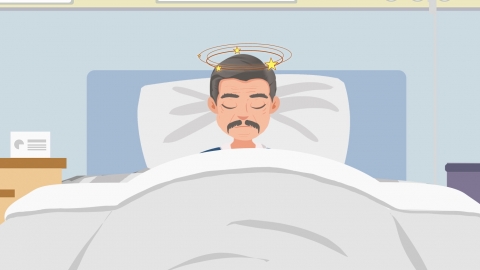Why Does Lack of Sleep Cause Dizziness?
Generally, insufficient sleep can cause dizziness due to possible reasons such as dehydration, hypoglycemia, anemia, cervical spondylosis, and Ménière's disease. Symptomatic management through general treatments and medications may be needed. If discomfort occurs, timely medical consultation is recommended for appropriate treatment under a doctor's guidance. Detailed explanations are as follows:

1. Dehydration
When the body is dehydrated, blood viscosity increases, slowing blood flow and affecting blood supply to the brain. The brain has high demands for oxygen and nutrients, so reduced blood supply can lead to symptoms such as dizziness and vertigo, possibly accompanied by thirst, dark urine, fatigue, and other symptoms. It is recommended to replenish fluids promptly, especially after exercise or in hot weather when hydration becomes more critical.
2. Hypoglycemia
Hunger or prolonged fasting can lead to low blood sugar levels. When blood glucose levels drop too low, the brain's energy supply is affected, causing dizziness, weakness, or even fainting. Symptoms may include sweating, trembling, palpitations, anxiety, and others. It is recommended to promptly consume sugary foods or drinks, such as eating a candy or drinking a glass of juice, to quickly raise blood glucose levels.
3. Anemia
Iron is an essential component for hemoglobin production, which transports oxygen from the lungs to tissues throughout the body. When the body lacks iron, hemoglobin synthesis decreases, leading to insufficient oxygen supply to the brain and causing dizziness. Symptoms may include pale complexion, fatigue, rapid heartbeat, and others. It is recommended to follow medical advice to use medications such as compound ferrous sulfate granules, iron dextran tablets, or iron sucrose injections to alleviate symptoms.
4. Cervical Spondylosis
Cervical spondylosis refers to degenerative changes in the cervical spine, such as intervertebral disc protrusion and bone spurs. These conditions may compress blood vessels and nerves in the neck, especially the vertebral artery, leading to insufficient blood supply to the brain and causing dizziness. Symptoms may include neck stiffness, shoulder and back pain, and arm numbness. It is recommended to use medications such as ibuprofen sustained-release capsules, diclofenac sodium tablets, or chlorzoxazone tablets under a doctor's guidance for treatment.
5. Ménière's Disease
Factors such as endolymphatic hydrops, immune abnormalities, and ischemia may lead to Ménière's disease, causing dysfunction of the inner ear's balance organs and resulting in rotational dizziness, hearing loss, tinnitus, and other symptoms. It is recommended to use medications such as betahistine mesylate tablets, diphenhydramine hydrochloride tablets, or methylprednisolone tablets under a doctor's guidance for treatment.
Improving sleep quality and ensuring adequate sleep duration in daily life can help alleviate dizziness symptoms.
References
[1] Jiang Ziwang, Mi Mingshan. Evaluation of Dizziness and Vertigo [J]. Cardiovascular Diseases Electronic Journal of Integrated Traditional Chinese and Western Medicine, 2020, 8(36): 196+198.
[2] Yu Lisheng, Kong Weijia, Huang Haiwei, et al. Exploring the Diagnostic and Therapeutic Approaches for Dizziness and Vertigo Through Case Studies [J]. Journal of Clinical Otorhinolaryngology and Head and Neck Surgery, 2023, 37(04): 302-306.









